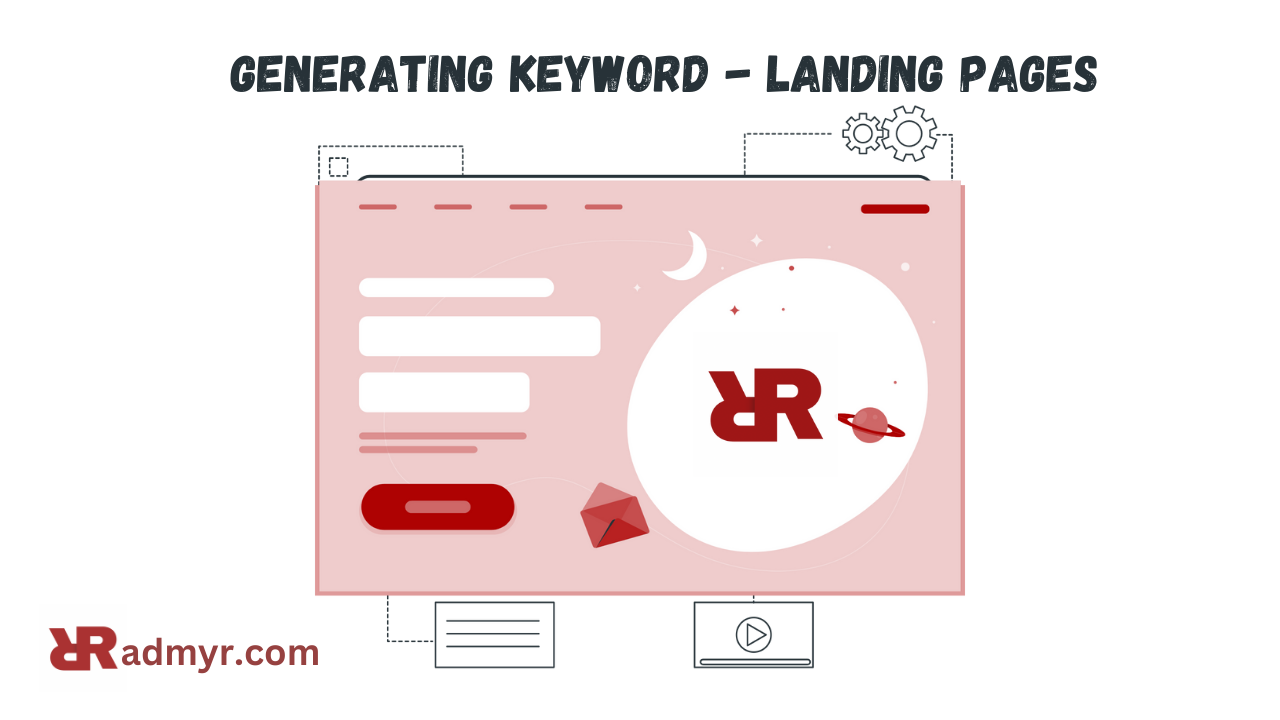In digital marketing, landing pages are the backbone of successful campaigns. Whether you’re running Google Ads, promoting a product on social media, or launching a new service, your landing page is where clicks turn into conversions.
The challenge? Crafting keyword-rich, persuasive landing pages at scale is time-consuming and requires a blend of SEO, copywriting, and design skills. Many businesses — especially startups and small teams — struggle to create optimized landing pages for every campaign or keyword cluster.
This is where an AI tool for generating keyword-focused landing pages comes in. These tools leverage artificial intelligence to analyze keyword intent, optimize on-page SEO, and automatically produce landing pages that are designed to rank higher in search engines while converting visitors into leads or customers.
In this guide, we’ll explore what these AI tools are, how they work, and why they’re becoming essential in modern digital marketing.
What Is an AI Tool for Generating Keyword-Focused Landing Pages?
An AI tool for generating keyword-focused landing pages is a software solution powered by artificial intelligence that helps marketers:
- Research and integrate target keywords into landing page content.
- Generate persuasive copy aligned with search intent (informational, commercial, or transactional).
- Design responsive layouts that drive conversions.
- Optimize SEO elements like meta descriptions, headers, and internal linking.
- A/B test automatically to refine messaging and increase conversion rates.
Instead of building one landing page per week, businesses can scale up and publish dozens — each tailored to different keyword groups.
👉 Example: A SaaS company offering project management software can use such an AI tool to instantly generate multiple landing pages for variations like “best project management software for startups,” “project management tools for remote teams,” or “affordable project tracking software.”
Why Keyword-Focused Landing Pages Matter
If you send all traffic to your homepage, you’re missing conversions. Landing pages exist to capture users with specific intent.
Benefits of Keyword-Focused Landing Pages:
- Higher SEO Rankings – Google rewards pages that align closely with keyword intent.
- Better Ad Performance – PPC ads linked to keyword-optimized landing pages achieve lower cost-per-click (CPC) and higher quality scores.
- Increased Conversions – Visitors are more likely to take action when the content matches exactly what they searched for.
- Scalability – AI enables businesses to create multiple keyword-driven pages without draining team resources.
According to HubSpot, companies with 30+ landing pages generate 7X more leads compared to those with fewer than 10.
Core Features of AI Tools for Generating Keyword-Focused Landing Pages
When evaluating an AI tool for generating keyword-focused landing pages, look for:
- Keyword Integration Engine → Automatically maps relevant keywords into headings, body text, and CTAs.
- Dynamic Content Personalization → Adapts landing page messaging based on audience segment or ad source.
- SEO Optimizer → Suggests improvements for title tags, alt texts, and internal linking.
- Built-in Analytics → Tracks bounce rates, conversions, and keyword performance.
- Drag-and-Drop Editors → Allow non-technical marketers to customize design quickly.
These features transform what used to take hours of manual work into a streamlined, AI-driven workflow.
Implementing an AI Tool for Generating Keyword-Focused Landing Pages
Step 1: Define Your Keyword Strategy
Before you use an AI tool for generating keyword-focused landing pages, you need a solid keyword strategy. AI can handle the automation, but without direction, it won’t deliver results.
- Keyword Research – Use tools like Ahrefs, SEMrush, or Google Keyword Planner to identify keywords with high search intent.
- Segment Keywords by Intent – Break them down into informational, commercial, and transactional.
- Example: “What is project management software?” (informational) vs. “buy project management software online” (transactional).
- Cluster Keywords – Group similar terms into clusters so your AI tool can generate multiple pages targeting different variations.
👉 With this structure, your AI tool will create keyword-optimized landing pages tailored to specific customer journeys.
Step 2: Select the Right AI Tool
Choosing the right AI tool for generating keyword-focused landing pages is critical. Here are some of the best options:
- Unbounce Smart Copy + Smart Traffic → Uses AI to generate high-converting landing page copy and optimize traffic distribution.
- Copy.ai Landing Page Generator → Great for creating SEO-rich content aligned with target keywords.
- Instapage AI Tools → Focused on personalized landing pages for ad campaigns.
- Writesonic’s Landing Page Generator → Quick generation of keyword-optimized copy, ideal for startups and small teams.
These platforms combine copywriting AI with design elements, allowing marketers to launch keyword-driven landing pages without coding.
Step 3: Customize for Your Audience
Even though AI automates the bulk of the work, human input matters. Ensure each landing page resonates with your audience by:
- Adding customer-centric headlines.
- Using persuasive CTAs (e.g., “Get Started in 5 Minutes” instead of “Submit”).
- Inserting trust signals like testimonials, logos, or case studies.
- Localizing language if you’re targeting different regions.
AI provides the structure, but personalization builds trust and drives conversions.
Step 4: Optimize SEO for Each Landing Page
An AI tool for generating keyword-focused landing pages should help with SEO, but you still need to review:
- Meta Descriptions → Ensure the target keyword is present.
- Header Tags (H1, H2, H3) → Naturally incorporate keyword clusters.
- Alt Text for Images → Include descriptive, keyword-rich alt text.
- Internal Links → Connect landing pages with related blog posts or resources.
This ensures not only relevance for search engines but also a smooth user journey across your site.
Step 5: Test, Measure, and Refine
AI is powerful, but ongoing optimization is key. Use A/B testing to refine:
- Headlines
- CTA button text and color
- Form length and placement
- Page layout
Most AI tools come with built-in analytics, but integrating with Google Analytics or Hotjar gives you deeper insights.
Real-World Use Cases of AI Landing Page Tools
🔹 E-commerce Stores
Generate pages for each product variation, optimized for long-tail keywords like “affordable wireless headphones for workouts”.
🔹 SaaS Businesses
Create tailored pages for different buyer personas, e.g., “CRM software for freelancers” vs. “CRM software for enterprises”.
🔹 Agencies
Scale landing pages for multiple clients without draining copywriters and designers.
🔹 Local Businesses
Produce geo-targeted landing pages like “plumbing services in Chicago” or “best dental clinic in Dallas.”
External Validation
According to a report from MarketingSherpa, personalized landing pages can increase conversions by up to 300%. Combining AI with keyword-focused strategies takes this to the next level by enabling personalization at scale.
Future Trends & Long-Term Benefits of Using an AI Tool for Generating Keyword-Focused Landing Pages
1. Future Trends in AI-Powered Landing Pages
The digital marketing world moves fast, and AI tools for generating keyword-focused landing pages are evolving even faster. Here are some trends businesses should prepare for:
a) Hyper-Personalization Through AI
Soon, landing pages won’t just be keyword-focused; they’ll be user-focused. AI will dynamically adjust headlines, CTAs, and even pricing based on visitor behavior, demographics, or browsing history.
b) Voice Search Optimization
With the rise of Alexa, Siri, and Google Assistant, landing pages generated by AI will increasingly need to target voice search queries. Expect tools to automatically create conversational, long-tail keyword pages.
c) AI + Predictive Analytics
AI tools will leverage predictive data to anticipate campaign success before launch. Imagine uploading keywords and seeing predictive conversion rates based on historical benchmarks.
d) Multi-Language Landing Pages at Scale
Global businesses will benefit from AI tools that instantly generate keyword-rich landing pages in multiple languages, ensuring localization without losing SEO value.
2. Advanced Strategies for Maximizing AI Landing Page ROI
To fully benefit from an AI tool for generating keyword-focused landing pages, businesses must go beyond automation.
🔹 Cluster-Driven Campaigns
Instead of creating one landing page per keyword, use keyword clusters. For instance, if your target keyword is “best running shoes”, generate landing pages around:
- “best running shoes for beginners”
- “best running shoes for marathons”
- “best affordable running shoes”
This clustered approach signals topical authority to search engines, boosting overall ranking.
🔹 AI-Generated Dynamic CTAs
Use AI to test dynamic CTAs that change based on traffic source. Example: visitors from Google Ads might see “Claim Your Discount Today” while organic visitors see “Download Free Guide.”
🔹 Integration with CRM & Email Marketing
Landing pages should not exist in isolation. Connect AI tools to platforms like HubSpot, Salesforce, or ActiveCampaign so that leads captured on landing pages are nurtured automatically.
🔹 Behavior-Triggered Content
Advanced AI tools will soon adjust landing page content in real time. Example: If a user scrolls halfway down without converting, the AI can trigger a pop-up with an exclusive offer.
3. Long-Term Benefits of AI-Generated Landing Pages
Investing in an AI tool for generating keyword-focused landing pages delivers benefits that compound over time:
- Scalability → Launch hundreds of targeted landing pages without growing your marketing team.
- Faster Campaign Execution → Instead of weeks of design and copywriting, AI produces pages in hours.
- Improved Conversion Rates → Keyword-targeted + AI-optimized copy means higher alignment with user intent.
- Cost Savings → Reduce reliance on expensive copywriters, designers, and developers for every landing page.
- SEO Authority Growth → Consistently publishing keyword-optimized landing pages builds topical authority in your niche.
According to Unbounce’s Conversion Benchmark Report, businesses that optimize landing pages with AI-driven personalization see 20-30% higher conversion rates compared to static pages.
4. The Human + AI Balance
While AI tools are powerful, the best results come from blending automation with human oversight. AI ensures speed, scale, and data-driven optimization, while humans bring creativity, brand voice, and emotional intelligence.
For businesses, the winning formula is:
👉 AI for scalability + Humans for authenticity.
Final Thoughts
The future of marketing belongs to businesses that can match keyword intent with customer needs at scale. An AI tool for generating keyword-focused landing pages allows exactly that — creating dozens or hundreds of optimized pages quickly, while freeing teams to focus on strategy and creativity.
In a world where competition for attention is fierce, AI landing page tools aren’t just nice to have — they’re becoming an essential driver of traffic, leads, and revenue.
📌 Frequently Asked Questions (FAQs)
1. How does an AI tool for generating keyword-focused landing pages actually work?
AI tools use natural language processing and machine learning to analyze keyword intent, generate relevant copy, and structure landing pages optimized for SEO. Many tools also provide design templates, A/B testing, and integrations with analytics or CRM platforms.
2. Are AI-generated landing pages good for SEO and Google rankings?
Yes, when used correctly. AI-generated landing pages can rank well if they are keyword-focused, unique, and provide real value to users. However, human oversight is crucial to avoid duplicate content or keyword stuffing, which can harm SEO.
3. Can I use an AI tool to generate multiple landing pages for different keyword clusters?
Absolutely. This is one of the biggest advantages. Instead of manually creating dozens of pages, AI tools can scale production for different long-tail keywords and customer segments, making it easier to dominate a niche in search results.
4. What are the risks of relying on AI landing page tools?
Potential risks include over-automation (generic or robotic copy), duplicate content issues, or lack of brand voice. That’s why the best practice is a hybrid approach — use AI for speed and structure, but refine with human editing for authenticity.
5. Which businesses benefit most from AI-generated landing pages?
Small businesses, e-commerce stores, SaaS companies, and marketing agencies see the most impact. These businesses often need multiple keyword-driven campaigns but lack the resources to build custom landing pages for each one manually.


Leave a Reply